Top 10 Best Racehorses of All Time
Who are the best race horses of all time? It's hard to choose.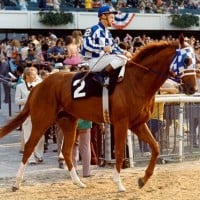 Secretariat, an American Thoroughbred racehorse, became a Triple Crown winner in 1973, setting records in all three events. Known for his exceptional speed and stamina, he is often regarded as one of the greatest racehorses of all time. His legacy continues to influence the horse racing world decades after his retirement.
Secretariat, an American Thoroughbred racehorse, became a Triple Crown winner in 1973, setting records in all three events. Known for his exceptional speed and stamina, he is often regarded as one of the greatest racehorses of all time. His legacy continues to influence the horse racing world decades after his retirement. The fastest horse on dirt from 1 3/16 to 1 5/8 miles in history.
Secretariat holds the STILL STANDING fastest recorded times in the world on dirt all the way from 1 3/16 to 1 5/8 miles in HISTORY, and is just 0.2 seconds off the current 1 1/8 mile world record. He NEVER lost a race that was not caused by ill health (x2), unprepared replacement for another horse in long distance race (x1), severe interference (x1) or unfair disqualification (x1). Excluding these factors, he won his remaining 16 races all by handsome margins of multiple lengths, never a photo finish. Under healthy and fair conditions he would beat ANY horse put against him, not by a nose, but by a margin of lengths.
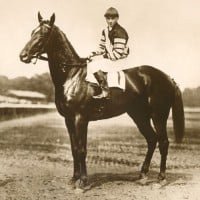 Often considered one of the greatest racehorses in history, Man O' War dominated American horse racing in the post-World War I era. Winning 20 of 21 races, his only loss, famously, was to a horse named Upset. Man O' War's impressive size, speed, and spirit left a lasting legacy in the racing world.
Often considered one of the greatest racehorses in history, Man O' War dominated American horse racing in the post-World War I era. Winning 20 of 21 races, his only loss, famously, was to a horse named Upset. Man O' War's impressive size, speed, and spirit left a lasting legacy in the racing world. For me, the only real way to compare and judge competitors from different eras in any athletic discipline is by how dominant they were. In that regard, Man O' War has no competition. He nearly made a mockery of the sport, and all his latest "races" were really just speed exhibitions. By that point, no one wanted to send their best horses out to be so dominated. Moreover, all of this was achieved with some of the highest handicap weights ever assigned. He was retired at age 3 because, had he raced another year, he likely would've been sent to post with even higher weight assignments - the highest assigned weights of any racehorse in history to this day.
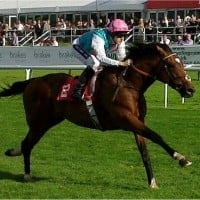 A British Thoroughbred, Frankel is celebrated for his unbeaten record in 14 races, a feat he achieved between 2010 and 2012. Renowned for his powerful acceleration, he was rated as the best racehorse in the world in May 2011. Frankel's success on the track has made him one of the most famous racehorses in recent history.
A British Thoroughbred, Frankel is celebrated for his unbeaten record in 14 races, a feat he achieved between 2010 and 2012. Renowned for his powerful acceleration, he was rated as the best racehorse in the world in May 2011. Frankel's success on the track has made him one of the most famous racehorses in recent history. Not a horse in the classic sense, but rather an unnatural force of nature. On the run-down to the stalls, I would get chills. By the time he was being loaded, I'd start to hear white noise. That's the sound of pure electricity. It hung in the air wherever the horse raced. You could slice the atmosphere with a knife. It was so thick with electricity. No other horse has ever given me these types of sensations.
When he ran, it was pure adrenaline. The air was thick with that too. He exuded it, and the other horses felt it. They all knew who was boss before they even went into the stalls. They could smell it and sense it. Frankel was, is, and will always be the king of all Alphas.
 An American Thoroughbred, Seabiscuit became an icon during the Great Depression for his unexpected victories against larger, more imposing competitors. His underdog story, highlighted by a victory in the 1938 match race against War Admiral, inspired many. Seabiscuit's rags-to-riches tale remains a quintessential part of American horse racing folklore.
An American Thoroughbred, Seabiscuit became an icon during the Great Depression for his unexpected victories against larger, more imposing competitors. His underdog story, highlighted by a victory in the 1938 match race against War Admiral, inspired many. Seabiscuit's rags-to-riches tale remains a quintessential part of American horse racing folklore. Seabiscuit, I think, should be the number 1 horse that ever lived because, unlike most of the horses on this list, they are born naturally big. Seabiscuit was the underdog before he showed the world what he was really made of. Despite his smaller size compared to his rivals at the time, he was asked to run with heavier loads but still managed to run in record time. Now imagine if he carried less weight. Woah. At the end of the day, even without the size or the handsomeness that Secretariat has, he still is one of the greatest that ever lived. This is because the horse has heart and is not willing to back down from any competition.
The reason I think she was the greatest racehorse ever is not only that she won 25 races from 25 starts, but also that she raced 24 of them over 5/6 furlongs. I've followed horse racing for the last 50 years, and although a lot of horses have had long winning streaks, none have won 25. More importantly, those that did win most of their races were from 1 mile to 1 and a half miles. No sprinter other than Black Caviar has had more than 10 consecutive wins over shorter distances. Somehow, they managed to have one or more off days, but Black Caviar always found a way to win.
 Hailing from New Zealand and trained in Australia, Phar Lap dominated Australian racing in the early 1930s, winning numerous major races. His heart, significantly larger than average, is seen as a symbol of his extraordinary endurance and racing ability. Phar Lap's mysterious death in 1932 only added to his legendary status in the racing community.
Hailing from New Zealand and trained in Australia, Phar Lap dominated Australian racing in the early 1930s, winning numerous major races. His heart, significantly larger than average, is seen as a symbol of his extraordinary endurance and racing ability. Phar Lap's mysterious death in 1932 only added to his legendary status in the racing community. Here are the facts when you compare Secretariat, Man O' War, and Phar Lap, taking into account the same factors such as distance, speed/time, weight carried, weight of the horse, track type, age, and condition.
Phar Lap weighed the most and carried the second-highest weight. He ran at 59.02 km/h in his last race, being 3 years older than both rivals whom I compared during their Belmont Stakes races in 1920 and 1973, which are considered to be similar races. The kinetic energy required by Phar Lap is 96,203 joules, compared to 79,198 joules for both Secretariat and Man O' War.
Taking emotion out of the equation, you find that Phar Lap was more powerful and exerted more force and kinetic energy. Based on the numbers, he was number 1.
Zenyatta had a human quality about her. She was an amazing racehorse. I've never seen a horse behind by three lengths with a furlong to go and win the race after kicking into the highest of gears. Zenyatta winning the Breeders' Cup Classic in 2009 was the equivalent of the New England Patriots' Adam Vinatieri winning the 2002 Super Bowl with a field goal on the last play of the game. Even better, possibly? Zenyatta running down St. Trinians in the 2010 Vanity was simply amazing.
If not for jockey error, Zenyatta would have also won the 2010 Classic and gone 20-20 all-time. Mike Smith shook her loose, inexplicably, two seconds too late. She would have beaten Blame going away if he had played that race right. Still, one of the best ever!
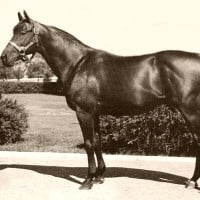 Citation, an American Thoroughbred, dominated post-World War II horse racing, becoming the eighth Triple Crown winner in 1948. Known for his versatility and consistency, he was the first horse to win 16 consecutive major stakes races. Citation's achievements on the track helped solidify his owner Calumet Farm's reputation in horse racing history.
Citation, an American Thoroughbred, dominated post-World War II horse racing, becoming the eighth Triple Crown winner in 1948. Known for his versatility and consistency, he was the first horse to win 16 consecutive major stakes races. Citation's achievements on the track helped solidify his owner Calumet Farm's reputation in horse racing history. Citation is number 1, folks. The greatest horse of the 20th Century. 27 for 29 as a 3-year-old speaks for itself. He won the Jersey Stakes by 11 lengths in the midst of the Triple Crown. The Pimlico Special was a walk-over - no one else would take him on. He ran on 10 different tracks.
To quote Andy Cannon, "If you went to Citation's grave today, and played a bugle, the call to the post. Citation would break out of the ground and beat everything else around." A LOT of folks still feel that that's true. Citation was the winner of the computer simulated race between the greats. There's no doubt about it - he's number one!
Sea Bird was the preeminent racehorse in Europe in the 20th century. He won the Epsom Derby and the Prix de l'Arc de Triomphe on the bridle, the only horse ever to do this. He was so good that he was never extended, so no one knows just how good he was. I have seen all the great racehorses of the past 50 years, but Sea Bird is the only one who sent shivers up and down my spine. Many people consider him the 'Champion of Champions.'
The caliber of the fields he beat and the manner in which he beat them marks Sea Bird as worthy of a top-three best ranking. However, I would have Secretariat at the top of the perch because of his Triple Crown-clinching win in the Belmont: simply astonishing!
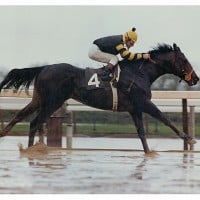 Seattle Slew, a champion American Thoroughbred, is celebrated for winning the Triple Crown in 1977. Remarkably, he was the first horse to win the Triple Crown while undefeated. Known for his powerful build and competitive spirit, Seattle Slew's legacy includes a significant impact as a sire.
Seattle Slew, a champion American Thoroughbred, is celebrated for winning the Triple Crown in 1977. Remarkably, he was the first horse to win the Triple Crown while undefeated. Known for his powerful build and competitive spirit, Seattle Slew's legacy includes a significant impact as a sire. I'll never forget his maiden when we all went to the racetrack to see the vaunted Six Crowns (son of Secretariat) run his first race. We went down to the paddock and all of a sudden, this humongous two-year-old was dancing and snorting into the paddock area. There immediately was no doubt as to who would win the race. Six Crowns who? You would never find another race where you could get these odds on Seattle Slew.
When Slew entered the track, the other horses would start foaming. He never had to run for speed, just enough to frustrate his opponent. His best race ever may be one he lost to Exceller. Slew had already defeated the field, including Affirmed in the 1978 Jockey Club Gold Cup. He was easing home with a furlong left when Exceller came charging past on the far outside. Slew caught a glimpse and began a second sprint to nearly catch Exceller at the finish line. He wasn't just a horse, he was a personality.
Why do people rank a great horse like her 7th? Ruffian was the greatest horse at under a mile, maybe even the greatest ever. She could sprint or stay and would beat anyone and everyone they threw at her. But on that fateful day, she would face a colt for the first time in her life. At the start, she banged her left shoulder on the starting gate and swerved hard on her right foot. Despite any pain, she kept running and in a few strides she was dead even with Foolish Pleasure.
After a brisk three furlongs, a flock of birds flew in front of them and the great filly's ankle snapped. She kept running, pulverizing her sesamoids, ripping the bone through her skin until finally, after 100 yards, she stopped. After 8 hours of trying to save Ruffian's life, she was finally put to rest. Her final resting place is in the infield at Belmont Park, with her nose pointed towards the finish line.
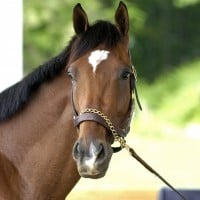 Barbaro, an American Thoroughbred, was widely admired for his victory in the 2006 Kentucky Derby by a margin of 6 1/2 lengths. His promising career was tragically cut short by a leg injury in the Preakness Stakes. Barbaro's subsequent fight for survival and the public's emotional response highlighted the deep connection between racehorses and their fans.
Barbaro, an American Thoroughbred, was widely admired for his victory in the 2006 Kentucky Derby by a margin of 6 1/2 lengths. His promising career was tragically cut short by a leg injury in the Preakness Stakes. Barbaro's subsequent fight for survival and the public's emotional response highlighted the deep connection between racehorses and their fans. I understand the sentiment of those who think it's not right to put Barbaro on a best racehorse list. For obvious reasons, I agree. But those people 1) didn't see him win the Kentucky Derby in one of the best fields in a very long time. Such a natural! Such ease! No sweat - literally. No foam at the mouth. Just a stroll in the park. He was amazing! I would have bet the farm on his winning the Triple Crown. In fact, after the Derby, I turned to a friend and said, "It would take something catastrophic to keep this horse from running away with the next two races." He loved to run, and it was so easy for him. So sad.
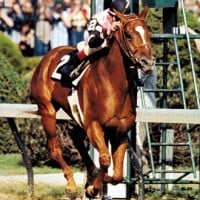 Affirmed, an American Thoroughbred, is renowned for winning the Triple Crown in 1978. His intense rivalry with Alydar, particularly in the 1978 Belmont Stakes, is one of the most famous in horse racing history. Affirmed's achievements on the track established him as one of the leading horses of his generation.
Affirmed, an American Thoroughbred, is renowned for winning the Triple Crown in 1978. His intense rivalry with Alydar, particularly in the 1978 Belmont Stakes, is one of the most famous in horse racing history. Affirmed's achievements on the track established him as one of the leading horses of his generation. Won more Grade 1 races than any other horse, going 22 for 29 lifetime, racing against Alydar, Seattle Slew, and Spectacular Bid! If you exclude Affirmed from your top ten list, you lose credibility in my opinion.
Magnificent horse. He won the Triple Crown races under increasing stretch pressure like no other winner ever endured. He had too much heart to allow Alydar to get his nose in front!
Affirmed, when he retired, was a horse they knew could set world records. Affirmed broke horses' hearts. They lost the will to ever race again. He is right up alongside Secretariat.
Interesting breeding, which shouldn't have produced a horse of this high caliber. He was a physically impressive specimen who oozed power. Apparently, he was not "molly-coddled" as a youngster. He looked his best when galloping up the hill at Newmarket in '71.
My two workmates went to Newmarket on that fateful day. They both firmly expected Mill Reef to overturn the form with My Swallow. I told them to watch for the Brigadier. The rest is history. He thrashed them both. Upon returning, one of my friends remarked that he was the most magnificent-looking horse in the field. I also shed tears when he got beat. He was the greatest.
I was at Atlantic City when he put away all of the best turf horses of his time in the one and three-sixteenth mile UN Handicap on good turf with 130+ pounds. It was his first time on turf, and he rated well and came again in the stretch! After that, he won a 7-furlong Grade I stake at Aqueduct in world record time of 1:20.2, eased up with 139 pounds on his back! Maybe the best all-around horse of all time!
Extraordinarily fast. He won 18 of 22 races, completed the mile in 1:32.2 carrying 134 lbs, and ran the second quarter in an unbelievably fast 20.6. He went under 2 minutes for 1 1/4 miles three times, carrying up to 135 lbs. No horse could run so fast carrying so much weight, except perhaps Forego. His Achilles heel was that he couldn't be rated and was given to chasing rabbits. In a match race with only one horse to focus on, he would be a formidable opponent for any horse that ever lived.
To say that Sea the Stars is in this position tells me how completely misguided this list is. Secretariat deserves his place at No. 1 due to his speed records, his Triple Crown win, and the fact that he broke all the records and still holds the Belmont Stakes record 40 years later. That's unbelievable. However, Sea the Stars has achieved something that no horse has ever done, and many have tried: winning the Guineas, Derby, and Arc in the same season, as well as three 10-furlong Group 1 races every month for six months. The two times he was pushed, he broke both race and track records for the distance. He always did enough, but I have no doubt that the better the opposition, the faster this colt could go. For me, he's a very close second to Secretariat.
Winx is an exceptional barometer horse. She is a phenomenon. I have never seen a horse win races so comfortably. Her stride rate is extraordinary. Perhaps she is a modern-day version of Seabiscuit, but she is truly remarkable. She consistently finishes the last 4 furlongs at unprecedented speeds with ease. In this regard, I think she could beat Frankel. In fact, Winx could sit on Frankel and pass him with her sustained burst. It's interesting because Black Caviar would beat Frankel for sure, up to at least 1200 meters. Winx would likely beat Frankel at 1800 meters and beyond. Having said all this, Phar Lap is on a different level of extraordinariness compared to Winx. While Winx is an all-time great, she pales in comparison to what Phar Lap achieved.
The "Wonder Filly" is one of the only fillies to ever have been compared to the great Ruffian. Her 20 1/4 length win in the Oaks was impressive, but her win in the Preakness against the boys was something else entirely. Her time at the Mother Goose Stakes was less than a second slower than the record set by Secretariat. She recently ran against the best male horses in the country at Woodbine, becoming the first filly to ever win that race. She also set a track and course record. Calvin Borel, who rode Mine That Bird to victory in the 2009 Kentucky Derby and gave up his Preakness ride to jockey Rachel instead, says that she is "the best horse he has ever ridden." His list of horses he has jockeyed is impressive, to say the least.
Unfortunately, there are too many Americans voting who simply don't appreciate what the Grand National is.
It is the ultimate test over the ultimate jumps over the ultimate distance. To win it once is incredible. To win it twice is phenomenal. To win it thrice is verging on impossible. Add in a win at the Scottish National in the same year, and its other two appearances also being in the top four finishes - it is simply one of the most outrageous achievements anyone has ever heard of.
I mean, I get that Secretariat was a phenomenally quick horse and has shattered records that have stood for years, and still holds those records today. But the Belmont is only a 12-furlong race.
The Grand National, to put it into perspective for people who don't know, is a National Hunt Steeplechase. It involves two laps of the track and over 30 fences. The field is usually around 50 horses but has been as many as 66 before. The fastest time ever recorded is just under nine minutes, and the race is just over four miles long.
Most years, there will be a horse fatality. Most horses that complete the race usually do not return, as the race simply breaks them. There are sometimes the rare, odd horses that can come back and compete in this race two or three times.
Red Rum ran it five times, winning it three times. It was never out of the top four places in its five completions, while also winning the Scottish National in the same year.
For Red Rum to have 2% of the vote in a "Best Ever Horse" poll is an insult to racing.
No horse has ever or ever will win FIVE straight Horse of the Year titles. No horse in history beat more great and/or other Hall of Fame, and divisional championship horses. The list includes a who's who of the first half of the 1960s, including Carry Back, Bald Eagle, Tompion, Never Bend, Jaipur, Ridan, Crimson Satan, Beau Purple, Roman Brother, Pia Star, Gun Bow, and Quadrangle. All while spotting huge amounts of weight. No horses today carry anything like what Kelso was forced to carry. And yet he continued to beat the best. Definitely in the Top Five of all time on any reliable list. Like Horse Racing Nation, NTRA, Racing Form. This list here is a joke in many ways.
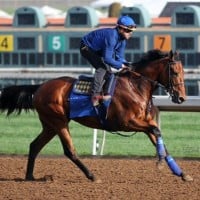 American Pharoah, an American Thoroughbred, achieved international fame by winning the American Triple Crown in 2015, the first to do so in 37 years. Known for his fluid running style and calm demeanor, he also won the Breeders' Cup Classic, completing the Grand Slam of Thoroughbred racing. American Pharoah's success revitalized interest in horse racing across the United States.
American Pharoah, an American Thoroughbred, achieved international fame by winning the American Triple Crown in 2015, the first to do so in 37 years. Known for his fluid running style and calm demeanor, he also won the Breeders' Cup Classic, completing the Grand Slam of Thoroughbred racing. American Pharoah's success revitalized interest in horse racing across the United States. I watched him when he won the Arkansas Derby and every race after that. When I saw him run, I just knew that this was the horse to do it. He runs so flawlessly that you can't take your eyes off him. I know he's no Secretariat, and I wasn't around during that time. But to me, he gives you that hope like Secretariat did, and that's all that matters.
Winning the Triple Crown seemed like only a pipe dream, but when he won, it looked like he won it with ease. He turned that dream into reality. Then he won the Breeders' Cup Classic in record time, and I cried when he crossed the finish line. I've never felt that much emotion for any racehorse. Thank you, Pharoah. You gave me hope, and I hope one day that I will be able to meet you. I think he deserves recognition because he turned non-horse fans into racehorse fans, if that makes sense.
Kincsem was undefeated in fifty-four starts. This alone is incredible. Now take into account the amazing advantages she gave her opponents in races. In one race, the starter had all the horses but Kincsem lined up. Kincsem was eating some grass off to the side. People tried to move Kincsem, but she wouldn't budge. So finally, the starter let the other horses go. Kincsem kept eating grass, watching them run away. Then she decided to run. She won. How many horses do you know of that can stand still at the start of a race and still win? And I think I forgot to mention the weight she carried. If I remember correctly, it went as high as 168 lbs.
Probably the greatest Derby winner of all time, and he would have been a great stallion at stud had it not been for the scum that killed this fantastic horse. May they rot in hell.
His Derby win in 1981 ranks alongside Frankel's 2000 Guineas win as a wonderful spectacle. Truly mesmerizing. A great advertisement for our sport.
He was outstanding! Swinburn and Piggott were also outstanding with him. Also, he was a very kind and beautiful racehorse.
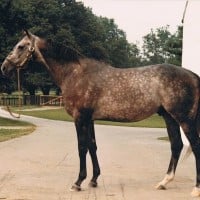 Spectacular Bid, an American Thoroughbred, was a major force in late 1970s horse racing, winning the Kentucky Derby and Preakness Stakes in 1979. Known for his resilience and remarkable speed, he missed the Triple Crown but secured a significant legacy with 26 wins in 30 starts. Spectacular Bid's performances on the track are remembered as some of the most impressive in racing history.
Spectacular Bid, an American Thoroughbred, was a major force in late 1970s horse racing, winning the Kentucky Derby and Preakness Stakes in 1979. Known for his resilience and remarkable speed, he missed the Triple Crown but secured a significant legacy with 26 wins in 30 starts. Spectacular Bid's performances on the track are remembered as some of the most impressive in racing history. I wouldn't put the Bid at #1 (although some would), but he deserves a lot more love than he gets. In American racing, the "classic" race distance is 1-1/4 miles on dirt. The Kentucky Derby, the Breeders' Cup Classic, and many of the famous handicaps are run at that distance. Think of all the great horses that have run that distance on dirt. Now, remember to ask who is the World Record Holder for 1-1/4 miles on dirt?
It is Spectacular Bid as a 4-year-old (1:57 & 4/5s at Santa Anita). It does not surprise me that the man in the saddle that day, Bill Shoemaker, has been quoted as saying that Spectacular Bid was the best horse he ever rode, and he rode a lot of great ones.
He was such an amazing horse he totally deserves to be in the top ten! Not only did he break a record but he also lived an incredibly long life for a horse not to mention race horse!
Triple crown winner, won belmont by over 25 lengths. Same record as secretariat, their careers are a parallal. Beautiful horse that had caring owners who retired him after an injury. Lived to the ripe old age of 33. No 3 horse of all time
If you put secretariat in the top ten then count fleet needs to be in the top ten.